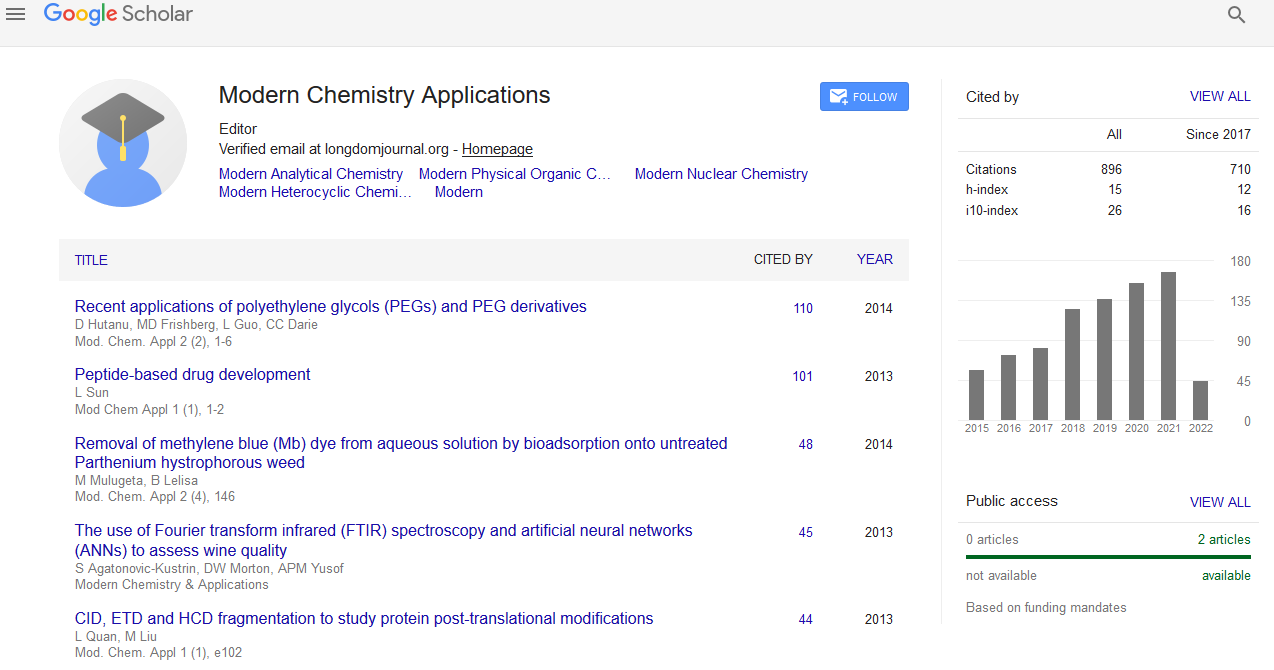Indexed In
- Open J Gate
- JournalTOCs
- RefSeek
- Hamdard University
- EBSCO A-Z
- OCLC- WorldCat
- Scholarsteer
- Publons
- Geneva Foundation for Medical Education and Research
- Google Scholar
Useful Links
Share This Page
Journal Flyer

Open Access Journals
- Agri and Aquaculture
- Biochemistry
- Bioinformatics & Systems Biology
- Business & Management
- Chemistry
- Clinical Sciences
- Engineering
- Food & Nutrition
- General Science
- Genetics & Molecular Biology
- Immunology & Microbiology
- Medical Sciences
- Neuroscience & Psychology
- Nursing & Health Care
- Pharmaceutical Sciences
Isolation and structural elucidation of 20 hydroxyecdystone from Vitex doniana sweet stem bark (black plum)
5th Global Chemistry Congress
September 04-06, 2017 | London, UK
Mustapha A Tijjani and Fanna I Abdulrahman
University of Maiduguri, Nigeria
Scientific Tracks Abstracts: Mod Chem Appl
Abstract:
Vitex doniana sweet, a plant commonly known black plum, in English, prunier noir in French, dinya in Hausa, ucha koro in Igbo, oori-nla in yoruba and ngarmi in Kanuri, is a medium-sized deciduous tree, 8-18 m high, with a heavy rounded crown and a clear bole up to 5 m. V. doniana is from Verbenaceae family and abundantly occurring in savannah regions. It can be found throughout tropical Africa. The ethanolic extract of Vitex doniana stem bark (11.9 g) was subjected to a silica gel accelerated column chromatography and eluents fractions (150 ml aliquots) obtained were collected and monitored with thin layer chromatography (TLC). Fractions with similar Rf values from same solvents system were poled together. Phytochemical test of all the fractions were perform. Complete elution yielded 48 fractions (150 ml/fraction) which were pooled to 24 fractions and finally to eight fractions and coded. Fraction Vd8-a (56 mg) has gave a single spot a white crystal compound coded V1 on checking with TLC and observed under Ultraviolet lamp .The Rf values was calculated to be 0.433 and melting point was found to be 241-243°C uncorrected. The infrared spectrum of compound V1 shows prominent peaks that corresponds to OHstr (3365 cm-1) and C=0 (1652 cm-1). The 1H NMR (400 MHz) spectrum of compound V1 in DMSO-d6 displayed five singlet signals. It further showed a broad singlet at δ 5.58 integrated for 1 H is due to an olefinic H-atom adjacent to the carbonyl carbon atom. Three signals at δ 3.10` (d, J=9.0 Hz, H-22), 3.59 (m, 1H, 2H-a) and 3.72 (m, 1H, 3H-e) each integrating for one proton is due to an oxymethine protons indicating that three oxymethine H-atoms were present in the compound. The 13C-NMR spectrum showed the presence of 27 carbon atoms, suggesting that may be steroid skeleton and DEPT-135 spectra showed the presence of five CH3, eight CH2, and seven CH groups, and seven quaternary C-atoms. The molecular formula was established as C27H44O7 by HRES-MS positive ion mode m/z 481.3179. Based on the spectral analysis, the compound V1 is thus concluded to have ecdysteroids skeleton and conclusively confirms with 2β, 3β 14α, 20R, 22R, 25-hexahydroxy-5 β cholest-7-ene-6- one, commonly known as 20-hydroxyecdysone. This is the first time this compound was isolated from Vitex doniana sweet.
Biography :
Mustapha A Tijjani has expertise in “Extraction, phytochemical analysis, isolation of compounds & structural identification and elucidation as well as pharmacological evaluation of compounds or extracts from plants”. He has worked with many indigenous plants in North Eastern Nigeria that have analgesic, anti-inflammatory, anticonvulsant and antipyretic properties.


